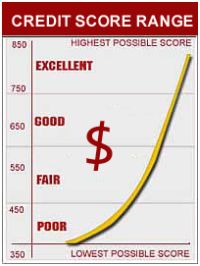CeCe Mitchell, manager of Zions Bank’s Women’s Financial Group says it’s time to get your credit report in shape.
Your credit score is not static. It can change every 30 days as your creditors report in the latest information to the credit bureaus. What you do can change it for the better.
• Although it can be tough, you’ve got to get your credit report in shape. That’s because credit has never mattered so much as it does today.
• Yes, banks are lending, but credit standards are high.
• Work to improve your credit score. The higher the number, the better you look to lenders. And you can possibly get lower interest rates.
Credit score ranges from 350-850, with an average US credit score around 680. If your score is below average, you should try to increase your credit score.
A score of 720 or higher will likely get you approved with a favorable interest rate.

1. Review your credit report and correct errors
2. Pay your bills on time
3. Pay down credit card balances
4. Don’t close unused credit cards
5. Never max out your credit card
1. Review Your Credit Report
The first thing to do to is to review your credit report from each of the three major reporting agencies closely. Then immediately clear up any errors, such as incorrect credit limits, late payments, or collection items that aren’t yours. Errors do show up on credit reports. Get it fixed and your score goes up.
You can get your credit reports for free from each of the three credit agencies once a year at www.annualcreditreport.com — and you’re never penalized for checking out your own credit report or score.
2. Pay your bills on time
• A single late payment on a credit card or other loan could ding your score by as much as 110 points if you already had a great score and 80 points for someone with an average score. So the best thing you can do to improve your score is make payments on time.
• Defaulting on a loan is the single worst thing you can do for your credit. A home foreclosure, for example, might dock about 200 points off your score and a short sale could cost you around 80 to 90 points. Declaring bankruptcy could lower a good score of 750 by up to about 250 points. Most negative information stays on your report for seven years (bankruptcies can stay on for 10 years).
• Consider setting your bills up for automatic withdrawal from your checking account using online banking with bill pay. At Zions Bank this service does not cost extra. You can’t be late if your bills are automatically paid each month.
• If you have overdue bills, make plans to get them caught up. Did you know that having an account go to a collections agency is a blemish on your credit report that stays there for up to seven years?
3. Pay down credit card balances
• Your debt utilization ratio (the amount of your total debt divided by your total available credit) accounts for almost 30% of your credit score, so this is a big part of your score.
• Carrying too much debt will not only cost you a fortune in interest, it can also destroy your credit rating.
• Your score looks better if you are using 30% of your available credit instead of 99%.
4. Don’t close all your unused credit cards
• Closing a line of credit could impact your debt to utilization ratio. For example, if you have two credit cards with a limit of $1,000 each and a $400 balance on one card, closing the other account will immediately double your debt to utilization ratio from 20% to 40%. Higher debt utilization will translate into a lower score. It is better to have two credit cards with usage level that stays low, instead of one card where you get close to the maximum each month.
• If you do decide to close out some unused cards, pick the newer ones and leave the older ones opened. Old credit lines give you a higher credit score.
5. Never max out your credit card
• A credit card that gets maxed out will lower your score, so use a different card that is way below the limit and pay down your high usage cards.
• Your score will look better if you have usage of 20-30% on a few cards instead of 80% on one card – even if you pay it off each month!
• Credit card companies may not sync the date you make your payment each month with the date they report to the credit bureau. This means that even if you pay your card off in full each month, if you have a balance on their reporting date, it will show up on your credit report.
For more information on personal finance and banking go to www.zionsbank.com















Add comment